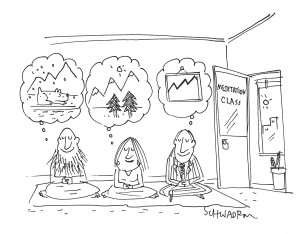Looking for an Antidote to Overload?
Posted: December 17, 2015 OK, I suppose that title has an obvious answer. With end-of-year fundraising and holiday events, December has always been a particular challenge. So it felt like a good month to share a habit I’ve developed this year that I recommend to all: meditation.
OK, I suppose that title has an obvious answer. With end-of-year fundraising and holiday events, December has always been a particular challenge. So it felt like a good month to share a habit I’ve developed this year that I recommend to all: meditation.
If your first reaction is some variation on “not for me,” I get it. I thought the same thing. My energy and constant motion are among my most defining traits. So the idea of quieting myself, especially my mind, seemed a stretch. But I found a meditation app – there are plenty out there – and in no time, it’s become routine. I’m not alone. I’ve read many articles, including one recently in The Wall Street Journal about family meditation, that come to the same conclusions I have. Meditation can help in being more productive, more reflective and a better decision maker.
In Praise of Pausing
First, a disclaimer of sorts: I know there are different practices and philosophies of meditation. I’m not advocating for any particular approach. My own practice is brief and adaptable to wherever I am. I was in Manhattan recently, running between meetings. With my head echoing conversations, I felt in need of a pause. I found a quiet place to sit, clicked onto my meditation app and took a moment to reset.
That’s one major benefit of meditation – it’s refreshing and reenergizing. And consequently, it really does help with productivity. In so many nonprofits, everyone has too much to do. It’s the same fraught mantra – overloaded and overwhelmed. The power of learning to pause is knowing when to stop – to take a moment to mentally sort out information and ideas you’ve collected and to decide what to keep and what to discard. By unloading, you remove mental clutter that can be distracting and slow you down.
Thinking Thoughtfully with Meditation
The balance of power that comes with meditation is not only the potential to get more done but to do it better. We live in a multitasking world, and certainly executive directors and other nonprofit leaders are expected to wear multiple hats and juggle multiple balls. As our devices speed up, there’s also the notion that thinking and creativity do too. But instead, from what I observe too often, it’s taking the first idea rather than finding the best one, or acting on a half-baked plan that falls flat, or taking short cuts that lead to dead ends. Stress fuels this quick thinking that isn’t necessarily good strategy. Meditation is a natural antidote to stress.
Mindfulness is another meditation-type practice. It’s about using techniques such as quiet breathing to achieve a clearer mental focus. “Mindfulness” is a great term because it’s precisely what’s needed in every organization – to be mindful of the big picture and to set priorities that reflect careful thinking on what will move the organization forward. If I can offer one gift to all at this holiday season, it’s the motivation to try some version of mindfulness. Trust me, it will be good for you and your nonprofit.
Have a nonprofit need? Let’s talk!

